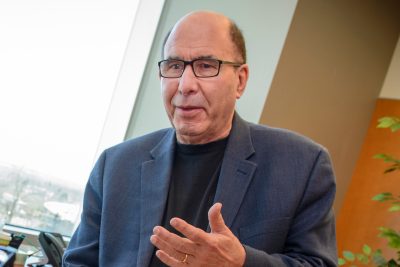UConn Health started its Colon Cancer Prevention Program a decade ago. Dr. Joel Levine, one of the co-founders, describes how what started as a novel approach to the disease is becoming a mainstream concept.

What makes the Colon Cancer Prevention Program successful?
The idea of prevention is what’s novel. There aren’t any other prevention programs that do what we do. If you Google “colon cancer prevention program,” we come out as the top listed patient centered resource.
Our process is very longitudinal. It’s not a one and done. We follow more than 6,000 people who return, at least annually, for both the latest information and for modulating their level of risk. Lowering risk is what we, the patient and Program, do. We are always learning how to do that more effectively. Indeed, we have not seen a colon cancer develop in someone who has been in the Program in about eight years. Put another way, if you come to us without colon cancer, we start by identifying risk and, then, follow you accordingly. If we reduce whatever risk level you have, we have not had a patient develop colon cancer on our watch.
The exceptions, so important to us, are patients who, on first visit, we find have colon cancer. Many patients are referred because of a positive FIT test (fecal immunochemical test). We introduced the quantitative FIT test to UConn Health and continue to study the test, over time, as an early marker for polyps or cancer. We work with the wonderful genetics group to identify those patients and families with inherited risk. Very few patients who have colon cancer in the family have actual inheritable risk (3 percent) but they are important to identify. These patients are followed closely, expecting them to develop colon cancer as a risk of their disease. We cannot as of yet prevent it in those inherited risk families, but we still can take steps to reduce risk by about half.
Prevention chose our program to feature in its “Guide to Preventing Disease” in its April issue. What do you see as the implications of that?
This is one of the largest magazine readerships in the world. The increasing recognition of a program dedicated to prevention is encouraging. Therefore we are at the tip of that spear and grateful to the Neag Comprehensive Cancer Center for supporting us from the outset.
We have a program whose purpose is to think about the disease. We are migrating from just doing colonoscopy, which is still important, to what do you do before and after the colonoscopy—how you define risk and how you then modulate the risk—and that’s prevention. In recent conversations with Dr. Dorado Brooks, who leads the colon cancer division of the national American Cancer Society, we plan to forward this more broad-based and lifelong strategy to lower the frequency and mortality of this disease. The evidence is emerging and our approach that combines the latest in scientific thought to patient care is shaping how we see the problem and solution.
What’s happening on the academic side?
We are publishing and hoping to influence thought. I just co-wrote an editorial for a leading GI journal with Dr. Joseph Anderson [former UConn Health colleague, now at Dartmouth] in which we discuss a particular type of colon cancer pathway. The emphasis is on how long it takes for that pathway to go from one level of risk to another. Young people can have polyps in that pathway but do not commonly develop colon cancer; it is only when they are much older do you see the colon cancers appear, so you have a long period of time in which the disease evolves. There are even specific risks, because this pathway involves DNA methylation, a biologic process that can silence key genes. This occurs progressively as you get older but can be increased cigarette smoking, a behavior we really fuss about. Dr. Anderson’s study of smoking risk, begun here, is very well recognized and regarded.
How has the approach to mitigating colon cancer prevention evolved over the program’s 10 years?
It’s really colonoscopy-plus, with super-sensitive blood stool testing, better understanding of the colon’s microbiome, and an ever-growing knowledge of modifiable risk factors. In this regard, Dr. Ethan Bortniker, who directs new approaches in clinical research, studies how other lifestyle factors (cardiovascular health, metabolic fat in the liver) influence colon polyps and cancer. Our patients know this and are proactive participants in their own well-being. They fastidiously stick with the program.
Overall the colon cancer attack rate is still low. If you have a 5 percent attack rate in a disease, your anxiety says, “Show me I don’t have the disease.” We hope to focus more on those who are likely the 5 percent. Early prediction of biologic and then clinical risk is the name of the game. Dr. Dan Rosenberg, who is the director of our basic research, is a leading authority and invaluable to our clinical approach. We hope to be able to understand the biology of early cancer risk and keep it from becoming a clinical reality. So far, we are making progress.